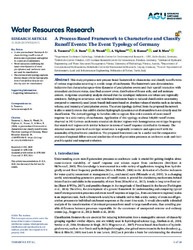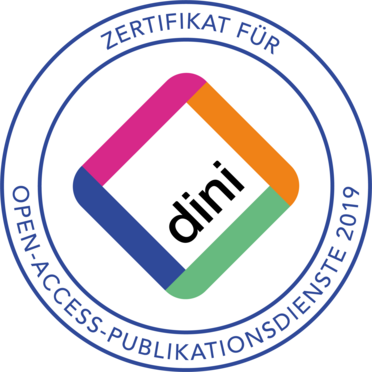A Process-Based Framework to Characterize and Classify Runoff Events: The Event Typology of Germany
DOI: https://doi.org/10.1029/2019WR026951
Persistent URL: http://resolver.sub.uni-goettingen.de/purl?gldocs-11858/9169
Persistent URL: http://resolver.sub.uni-goettingen.de/purl?gldocs-11858/9169
Tarasova, L.; Basso, S.; Wendi, D.; Viglione, A.; Kumar, R.; Merz, R., 2020: A Process-Based Framework to Characterize and Classify Runoff Events: The Event Typology of Germany. In: Water Resources Research, Band 56, 5, DOI: 10.1029/2019WR026951.
 |
Dokument öffnen: |
This study proposes a new process-based framework to characterize and classify runoff events of various magnitudes occurring in a wide range of catchments. The framework uses dimensionless indicators that characterize space–time dynamics of precipitation events and their spatial interaction with antecedent catchment states, described as snow cover, distribution of frozen soils, and soil moisture content. A rigorous uncertainty analysis showed that the developed indicators are robust and regionally consistent. Relying on covariance- and ratio-based indicators leads to reduced classification uncertainty compared to commonly used (event-based) indicators based on absolute values of metrics such as duration, volume, and intensity of precipitation events. The event typology derived from the proposed framework is able to stratify events that exhibit distinct hydrograph dynamics even if streamflow is not directly used for classification. The derived typology is therefore able to capture first-order controls of event runoff response in a wide variety of catchments. Application of this typology to about 180,000 runoff events observed in 392 German catchments revealed six distinct regions with homogeneous event type frequency that match well regions with similar behavior in terms of runoff response identified in Germany. The detected seasonal pattern of event type occurrence is regionally consistent and agrees well with the seasonality of hydroclimatic conditions. The proposed framework can be a useful tool for comparative analyses of regional differences and similarities of runoff generation processes at catchment scale and their possible spatial and temporal evolution.
Statistik:
ZugriffsstatistikSammlung:
- Geographie, Hydrologie [454]
Schlagworte:
event classificationevent type
rainfall-runoff events
event typology
event characteristics
runoff generation mechanisms
This is an open access article under the terms of the Creative Commons Attribution License, which permits use, distribution and reproduction in any medium, provided the original work is properly cited.

